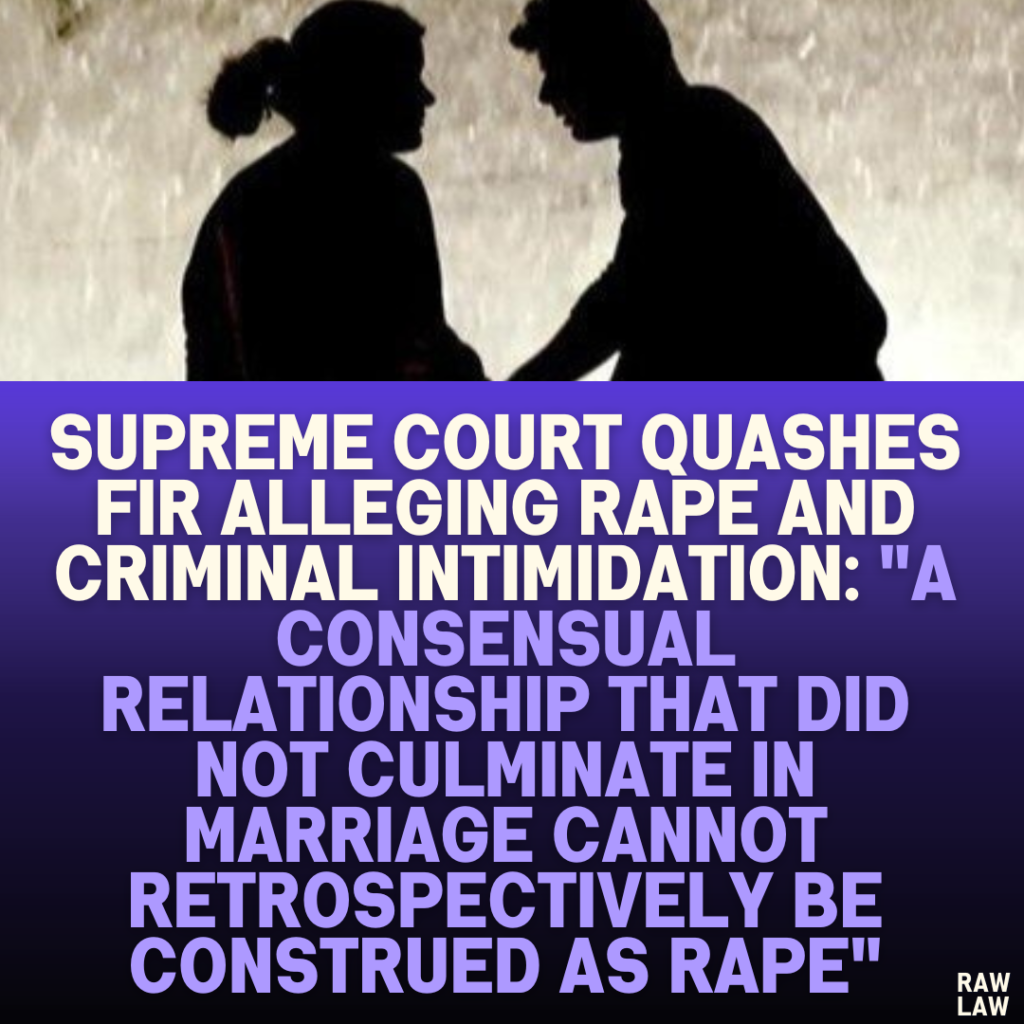Court’s Decision:
The Supreme Court quashed the FIR registered under Sections 376(2)(n) and 506 of the IPC, filed by the complainant against the appellant. The Court held that the relationship between the parties was consensual, and the allegations did not establish the statutory ingredients of rape or criminal intimidation. It declared that continuation of the prosecution would amount to abuse of judicial process and set aside the High Court’s decision refusing to quash the FIR.
Facts:
- Filing of FIR:
- The complainant alleged that the appellant engaged in a sexual relationship with her on multiple occasions, starting in 2017, based on a promise of marriage.
- She also accused the appellant of threatening her with harm to force her into maintaining the relationship.
- Relationship Timeline:
- The appellant and complainant first met in 2017, and their association continued over the years, including physical meetings at parks and homes.
- The complainant claimed the appellant repeatedly engaged in non-consensual sexual acts and later refused to marry her.
- Subsequent Marriages:
- In 2019, the appellant married another individual, and the complainant married in 2020.
- High Court’s Observations:
- The High Court dismissed the appellant’s petition for quashing the FIR, stating that the complainant’s allegations were sufficient to establish a lack of consent and prima facie supported the offences.
Issues:
- Whether the allegations in the FIR, even if taken at face value, constituted offences under Sections 376(2)(n) (repeated rape) and 506 (criminal intimidation) IPC.
- Whether the High Court erred in refusing to quash the FIR under Section 482 CrPC.
Petitioner’s Arguments:
- Consensual Relationship:
- The appellant argued that the relationship was voluntary and consensual.
- The FIR was filed out of personal vengeance after the appellant’s marriage.
- Inconsistencies in Statements:
- Contradictions were highlighted between the complainant’s FIR, her medical examination report, and her statement under Section 164 CrPC.
- The complainant alleged different timelines of the incidents, undermining the credibility of her claims.
- Absence of Cognizable Offence:
- The allegations did not disclose any prima facie case of rape or criminal intimidation, warranting quashing of the FIR.
Respondent’s Arguments:
- Prima Facie Case Established:
- The complainant’s allegations in the FIR and Section 164 CrPC statement disclosed sufficient grounds to establish offences.
- Threats and False Promises:
- The appellant had coerced the complainant into a relationship by threatening to harm her brother and making false promises of marriage.
- Delay in Filing the FIR:
- The complainant explained the delay in reporting the incidents as arising out of fear induced by the appellant’s threats.
Analysis of the Law:
- Section 376(2)(n) IPC:
- This section punishes individuals who commit rape repeatedly on the same woman. The statutory requirements include:
- Lack of consent, or consent obtained through coercion, misrepresentation, or false promises.
- The Court found no evidence of a false promise of marriage or coercion sufficient to invalidate the complainant’s consent.
- This section punishes individuals who commit rape repeatedly on the same woman. The statutory requirements include:
- Section 506 IPC:
- Criminal intimidation requires proof of threats to cause harm with the intent to alarm or compel an individual into actions against their will.
- The Court held that the prolonged relationship, described as cordial, undermined the complainant’s claims of threats.
- Scope of Section 482 CrPC:
- In State of Haryana v. Bhajan Lal (1992), the Supreme Court outlined grounds for quashing proceedings, including cases where allegations do not disclose any offence or where proceedings are maliciously instituted.
Precedent Analysis:
- Pramod Suryabhan Pawar v. State of Maharashtra (2019):
- Held that a consensual relationship cannot be construed as rape unless it was initiated through a deliberate false promise of marriage.
- Consent obtained under false promises must demonstrate bad faith at the time of making the promise.
- XXXX v. State of Madhya Pradesh (2024):
- Reaffirmed that consensual relationships between educated adults, with full awareness of consequences, cannot retrospectively be labeled as non-consensual or criminal.
Court’s Reasoning:
- Consensual Nature of Relationship:
- The complainant continued her relationship with the appellant over an extended period, meeting him at various locations, indicating voluntary participation.
- Both parties had intended to marry each other, negating allegations of coercion or false promises at the outset.
- Lack of Ingredients for Rape or Intimidation:
- The complainant’s claims of coercion and threats were unsubstantiated, as no evidence supported her assertions of fear or forced submission.
- A consensual relationship that did not culminate in marriage cannot retrospectively be construed as rape.
- Abuse of Legal Process:
- The FIR appeared to be motivated by personal grievances following the appellant’s marriage, rendering the criminal proceedings malicious.
- High Court’s Error:
- The High Court failed to recognize the consensual nature of the relationship and erred in refusing to quash the FIR.
Conclusion:
The Supreme Court quashed the FIR, the charge sheet, and the trial proceedings. It emphasized that continuing the prosecution would constitute an abuse of judicial process and harm the appellant’s reputation unjustifiably.
Implications:
- Protection Against Malicious Prosecution:
- The judgment safeguards individuals from criminal allegations arising out of consensual relationships.
- Clarity on False Promise Cases:
- It reiterates that mere failure of a relationship to result in marriage does not constitute rape unless the promise was fraudulent and motivated by bad faith.
- Judicial Efficiency:
- By quashing frivolous and baseless cases, the Court ensures judicial resources are directed toward genuine grievances.




Pingback: Kerala High Court Partially Quashes Domestic Violence Proceedings: Husband to Face Trial for Prima Facie Cruelty Under Section 498A IPC; Parents Excluded Due to General Allegations - Raw Law